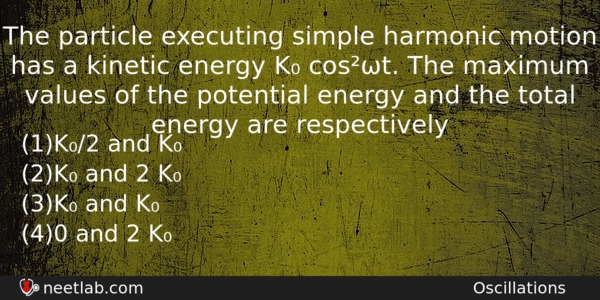| ⇦ | 
| ⇨ |
The particle executing simple harmonic motion has a kinetic energy K₀ cos²ωt. The maximum values of the potential energy and the total energy are respectively
Options
(a) K₀/2 and K₀
(b) K₀ and 2 K₀
(c) K₀ and K₀
(d) 0 and 2 K₀
Correct Answer:
K₀ and K₀
Explanation:
Kinetic energy + Potential energy = total energy
When kinetic energy is maximum, potential energy is zero and vice versa.
.·. Maximum potential energy = total energy
0 + K₀ = K₀
(K.E + P.E = Total energy) .
Related Questions: - Consider two nuclei of the same radioactive nuclide. One of the nuclei was created
- The rest mass of a body is m1. It moves with a velocity of 0.6c, then its relativistic
- A body is thrown with a velocity of 9.8 m/s making angle of 30° with the horizontal
- The velocity of a particle at an instant is 10 ms⁻¹.After 3 s its velocity will become
- The rms current in an AC circuit is 2 A. If the wattless current be √3 A,
Topics: Oscillations
(58)
Subject: Physics
(2479)
Important MCQs Based on Medical Entrance Examinations To Improve Your NEET Score
- Consider two nuclei of the same radioactive nuclide. One of the nuclei was created
- The rest mass of a body is m1. It moves with a velocity of 0.6c, then its relativistic
- A body is thrown with a velocity of 9.8 m/s making angle of 30° with the horizontal
- The velocity of a particle at an instant is 10 ms⁻¹.After 3 s its velocity will become
- The rms current in an AC circuit is 2 A. If the wattless current be √3 A,
Topics: Oscillations (58)
Subject: Physics (2479)
Important MCQs Based on Medical Entrance Examinations To Improve Your NEET Score
18000+ students are using NEETLab to improve their score. What about you?
Solve Previous Year MCQs, Mock Tests, Topicwise Practice Tests, Identify Weak Topics, Formula Flash cards and much more is available in NEETLab Android App to improve your NEET score.
Share this page with your friends

Leave a Reply